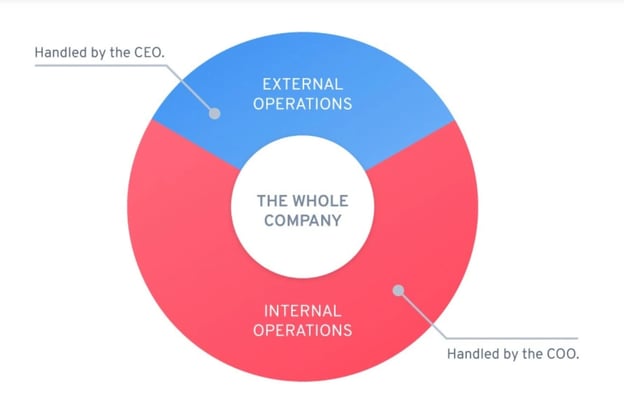Most companies have goals related to growth. I’m not sure of many companies that want to make less money or reach fewer people over time.
However, a company can’t just magically make more money, reach new customers, or grow a team overnight. It takes intention and strategy from an experienced leader to facilitate this type of growth.
As a company looks to scale, having a qualified chief operating officer is a critical aspect of making those a reality. Leading this type of change as a chief operating officer can be a dynamic opportunity for budding business leaders. Let’s discuss the significance of the role, what a chief operating officer does, and the qualifications you’ll need to become one.
What is a COO?
A chief operating officer (COO) is a c-suite executive who is responsible for overseeing the operational activities of a company. Individuals in this role typically report to the CEO and serve as second-in-command for the business.
If a company has a chief operating officer in place, this individual likely knows the ins and outs of the business and industry and is often responsible for making sure the company’s operational model is functioning properly.
The COO needs to know how key functions of the company (including product, finance, marketing, service) all work together to deliver a positive experience for the customer while reaching key business goals.
In 2021, the average base salary of a chief operating officer was , though this figure can vary and the experience level of the candidate.
It’s worth noting how this role differs from the chief executive officer (CEO). Once a company experiences a period of substantial growth and has public-facing activities, the CEO may begin focusing on external management of the company affairs and representing the company to the public. That’s when a full-time or may be brought on board to ensure the company’s internal affairs are being handled properly.

Now that you know what a COO is and how the role differs from that of a CEO, let’s cover what a COO does in their day-to-day.
What does a chief operating officer do?
At a high level, the chief operating officer is responsible for making sure all of the internal systems that make a company run smoothly are in good working order so the business can run optimally. They’re tasked with integrating the company’s mission, vision, goals, and operations for strategic alignment and execution.
Key tasks for a COO can include:
- Overseeing the management and optimization of the company’s daily operations
- Working directly with the CEO and other members of the c-suite to establish and implement the organizational vision, business strategy, and staffing plans
- Creating business budgets for financial growth and proper resource management
- Analyzing key data to understand the company’s progress to key goals and objectives and make recommendations as needed to improve performance
How to Become a COO
Do you have your eye on a chief operating officer position? Or are you looking to build the skills to become one in the future? Let’s talk about what you need to qualify for the role.
Though there is no specific educational track that guarantees landing a COO role, in the US have a bachelor’s degree and 20% have earned a master’s degree.
It’s important to note that many COO roles are filled internally. That means leaders are typically promoted or appointed into the position from within the company. That certainly doesn’t mean you won’t see or have the opportunity to apply for external chief officer position roles, but it is an important practice to be aware of if you have aspirations to become a COO.
With that in mind, you may want to consider working under an existing COO to gain the necessary experience and to put yourself in a better position to be appointed into the role down the line.
For potential COO’s, experience can be a differentiating factor during the hiring process. According to research by , the average COO had 10 to 15 years of relevant experience before landing the role.
Successful chief operating officers need experience in business operations, data analysis, problem-solving, leadership, and management, as these are all skills that will be used daily on the job. As you embark on becoming a COO, make sure you have relevant experience optimizing and integrating organizational processes.
Here are some more skills and qualifications chief operating officer candidates need:
- Expert-level industry knowledge
- Strong communication skills
- The ability to make strategic decisions for the company
- Experience identifying organizational challenges and implementing effective solutions
- Proven track record of successfully leading and managing teams
- Cross-functional collaboration
- Project management skills
The role of chief operating officer provides a unique opportunity to leverage business expertise, strategic leadership, and operational support within one executive-level role to support the growth and future trajectory of a company.
Leadership
.png?width=112&height=112&name=Image%20Hackathon%20%E2%80%93%20Vertical%20(39).png)


![The Most Common Leadership Styles & How I Found Mine [Expert Insights]](https://www.hubspot.com/hubfs/leadership-styles-4.jpg)

![The Content Marketer's Guide to Thought Leadership [+ Inspiring Examples & Expert Tips]](https://www.hubspot.com/hubfs/216_Thought%20Leadership.webp)



![The Best Ways to Get Visibility from Your CMO and Other Marketing Execs Who Can Move You Forward [Data]](https://www.hubspot.com/hubfs/marketing%20manager%20trying%20to%20increase%20marketing%20executive%20visibility%20in%20their%20role.jpg)

